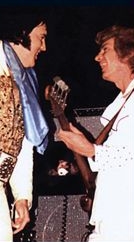Posted May, 2012
 As a huge Elvis fan, it’s always a huge honor and rush for me when I get to chat with anyone who has worked with the King in any way, shape or form – and I’ve chatted with quite a few of them. Having recently reviewed his autobiography, Way Down, I was given the opportunity to ask former Elvis bassist, Jerry Scheff, a few short questions, I was absolutely delighted because not only did Mr. Scheff play bass for Presley but with other music icons such as Bob Dylan, John Denver and the Doors.
As a huge Elvis fan, it’s always a huge honor and rush for me when I get to chat with anyone who has worked with the King in any way, shape or form – and I’ve chatted with quite a few of them. Having recently reviewed his autobiography, Way Down, I was given the opportunity to ask former Elvis bassist, Jerry Scheff, a few short questions, I was absolutely delighted because not only did Mr. Scheff play bass for Presley but with other music icons such as Bob Dylan, John Denver and the Doors.
However, in my mind, THE most memorable bass riffs in rock and roll history are those played by Scheff on Elvis’ live versions of Polk Salad Annie (especially on the Live from Madison Square Garden album) and on the Doors’ L.A. Woman. Those riffs will be etched into the American psyche until the end of time.
After complimenting Jerry on his outstanding book, I asked the legendary bassist how sales have been going with Way Down.
“Thank you Randy. The book is selling nicely in the U.S. and Europe and, so far, I’ve received great reviews. The only negatives have been from fans of this singer or that, who complain that I didn't devote enough time to their favorite. Oh, I suppose I could have built six weeks working with the Doors into two or three chapters, but it would been a bunch of crap.”
Many authors, after completing a book, will often second guess what they should or should not have included in their books. One clear image of Jerry Scheff that I gleaned from Way Down is that, whatever he does, he does and moves on. That said, I still asked him if there was anything he wished he had or hadn’t included in his book. His answer was short, direct and to the point.
“Being that I wrote the book as a musical history of my life I am satisfied with everything as it is.”
Jerry is a monster talent and has played with and for some monster talent. With such a long list of musical dignitaries who he has supported over his distinguished career, I was naturally curious who he wished he could have played with before they passed away.
“There isn't enough disk space in my computer to list everyone I wish I had played with. Where would I start? Probably Jimi Hendrix, Miles Davis, Chopin, Louis Armstrong, etc.”
In my interview with Scheff’s former band mate, James Burton, he spoke highly of John Denver. In Way Down, while he was characteristically plain spoken about Denver, he ended his segment about him by saying, “. . . of all the musicians with whom I have been acquainted with who have since died, John is the one I miss the most.”
When I asked Jerry if that comment wouldn’t come as a shock to Presley fans, he said, “I don't think so. Maybe I should have said 'personally missed the most.' I spent much more personal time with John than I did with Elvis.”
Scheff’s last line of the book says, “ . . . I don’t think I will dance on Elvis’ grave again” and comes after a scenario involving a European TCB tour. I asked him to elaborate on that comment.
“First of all, you have taken that line out of context. The pages leading up to that explain that line in a little more depth. The 'Mr Potato Head', make-a-buck mentality had affected the shows to the point that music was taking second place. My bank account is lighter, but my heart is lighter too.”
At the time of my questioning of Mr. Scheff, I was also working on an interview with one of Elvis’ former back-up singers, Donnie Sumner (who, coincidentally, has a new book out, too, entitled In The Shadow of Kings). The comments Jerry made relative to Donnie reveal more of what the social structure of Presley’s massive musical support.
“I didn't really know Donnie. I was from a different neck of the woods so to speak. He always seemed to be a happy, friendly guy. I spent a lot more time with Donnie;s uncle J.D. Sumner. On the other hand, Donnie was around Elvis a lot more than I was. I am sure he has some good things to say in his new book.”
Scheff’s son, Jason, is quite an accomplished musician in his own right and plays for the group, Chicago, joining them in 1985 as Peter Cetera’s replacement. I asked Jason’s proud dad what differences and similarities did he see between his and his son’s careers.
“First of all, Jason is a great singer. I never have been. Jason writes much more music than I ever did. He certainly is a better business man than me. I have made my mark as a bass player playing many styles of music over a lot of years. I wish I could be around to see where his career takes him to when he's my age. In other words, it’s the old 'comparing apples and oranges' thing isn't it?”
In discussing the state of the music business, I asked Jerry if he thought the music business needed fixing and, if he were made “Music Czar”, what would he do to fix it, if anything. His answer revealed both the mind of someone who has watched it all happen as he was along for the ride as well as one who knows that things change and, in order to survive, you either adapt or die.
“I would never take that job. However, I think the freedom of the internet is already doing a lot to expose new talent and the old style record business is on its way out.”
My final question during our exchange focused on how the legendary bassist wished to be remembered and what he hopes his legacy will be. He deferred to an interview that his son gave and I thought the quote he used was incredible.
“Back to my son Jason: Jason did a radio interview in Los Angeles on KROC I think it was, and the interviewer asked him, 'How have you been influenced by your father'. I am sure he meant as a bass player, but Jason said, 'My dad taught me to accept people no matter what color, nationality or religion.”










